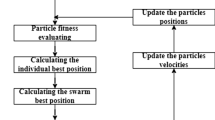Abstract
This paper puts forward a useful method for step length adaptation of the mutation distribution in ES- using the GPC (Generalized Predictive Control) to adapt the global step size. Similar to the concept of evolution path, the mutation step is the function of historical information generated by the iterative processes of ES algorithm. In our method, the ES algorithm is regarded as a controlled system and modeled as a CARIMA (Controlled Auto Regressive Integrated Moving Average) model. The parameters of CARIMA model are estimated by RLS (the recursive least squares) with forgetting factor, and then the current global optimum step size (the control parameter) is calculated by the GPC to feed back to ES, the output and the control quantum are used to estimate the parameters of CARIMA model iteratively.
Access this chapter
Tax calculation will be finalised at checkout
Purchases are for personal use only
Preview
Unable to display preview. Download preview PDF.
Similar content being viewed by others
References
Liang, J.J., Qin, A.K., Suganthan, P.N., Basker, S.: Comprehensive Learning Particle Swarm Optimizer for Global Optimization of Multimodel Functions. IEEE Trans. Evol. Comput. 10(3), 281–295 (2006)
Koumousis, V.K., Katsaras, C.P.: A Saw-tooth Genetic Algorithm Combining the Effects of Variable Population Size and Reinitialization to Enhance Performance. IEEE Trans. Evol. Comput. 10(1), 19–28 (2006)
Ma, P.C.H., Chan, K.C.C., Yao, X., Chiu, D.K.Y.: An Evolutionary Clustering Algorithm for Gene Expression Microarray Data Analysis. IEEE Trans. Evol. Comput. 10(3), 296–314 (2006)
Alba, E., Dorronsoro, B.: The Exploration/Exploitation Tradeoff in Dynamic Cellular Genetic Algorithms. IEEE Trans. Evol. Comput. 9(2), 126–142 (2005)
Leung, Y.W., Wang, Y.P.: An Orthogonal Genetic Algorithm with Quantization for Global Numerical Optimization. IEEE Trans. Evol. Comput. 5(1), 41–53 (2001)
Powel, M.J.D.: On Trust Region Methods for Unconstrained Optimization Without Derivatives. Dept. Appl. Math. Theoretical Phys., Univ. Cambridge, Cambridge, U.K., Work Rep. DAMTP 2002/NA02 (2002)
Lee, C.Y., Yao, X.: Evolutionary Programming Using Mutations Based on the Levy Probability Distribution. IEEE Trans. Evol. Comput. 8(1), 1–13 (2004)
Wang, Y., Dang, C.: An Evolutionary Algorithm for Global Optimization Based on Level-Set Evolution and Latin Squares. IEEE Trans. Evol. 11(5), 579–586 (2007)
Author information
Authors and Affiliations
Editor information
Editors and Affiliations
Rights and permissions
Copyright information
© 2012 Springer-Verlag Berlin Heidelberg
About this paper
Cite this paper
Dong, W., Liu, J. (2012). Step Length Adaptation by Generalized Predictive Control. In: Huang, DS., Gan, Y., Gupta, P., Gromiha, M.M. (eds) Advanced Intelligent Computing Theories and Applications. With Aspects of Artificial Intelligence. ICIC 2011. Lecture Notes in Computer Science(), vol 6839. Springer, Berlin, Heidelberg. https://doi.org/10.1007/978-3-642-25944-9_84
Download citation
DOI: https://doi.org/10.1007/978-3-642-25944-9_84
Publisher Name: Springer, Berlin, Heidelberg
Print ISBN: 978-3-642-25943-2
Online ISBN: 978-3-642-25944-9
eBook Packages: Computer ScienceComputer Science (R0)




